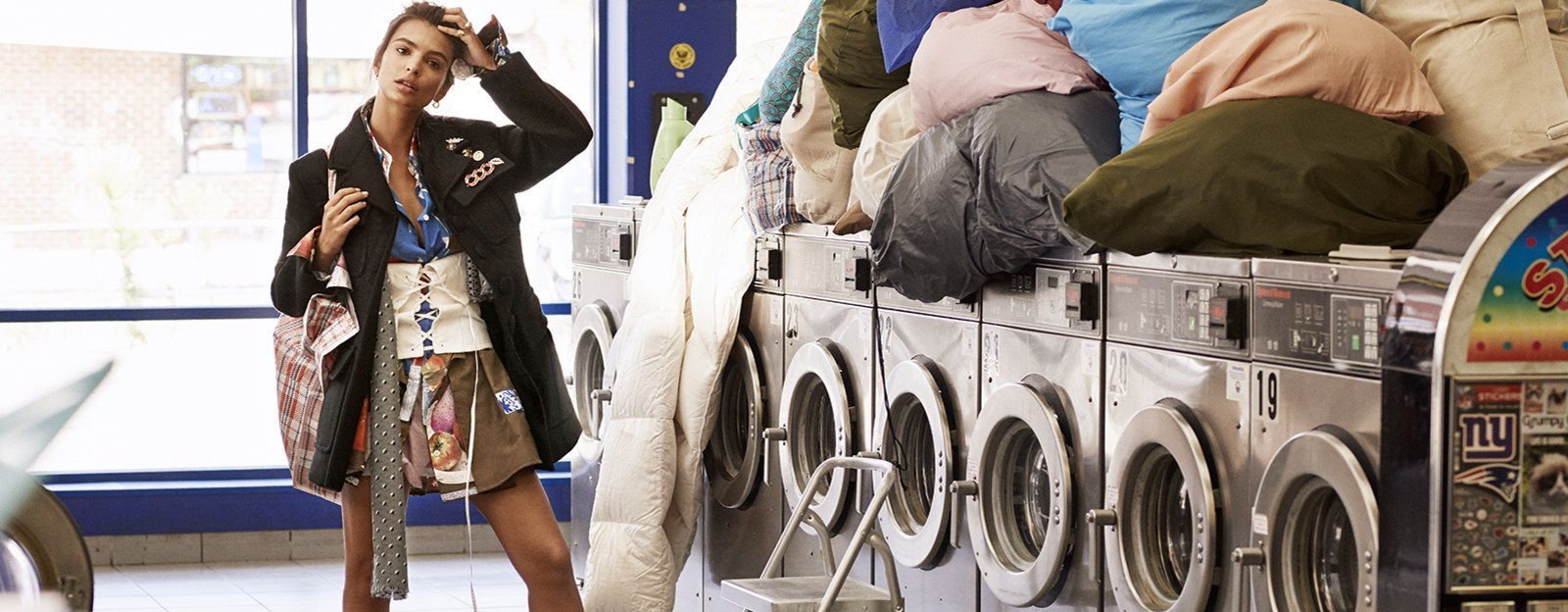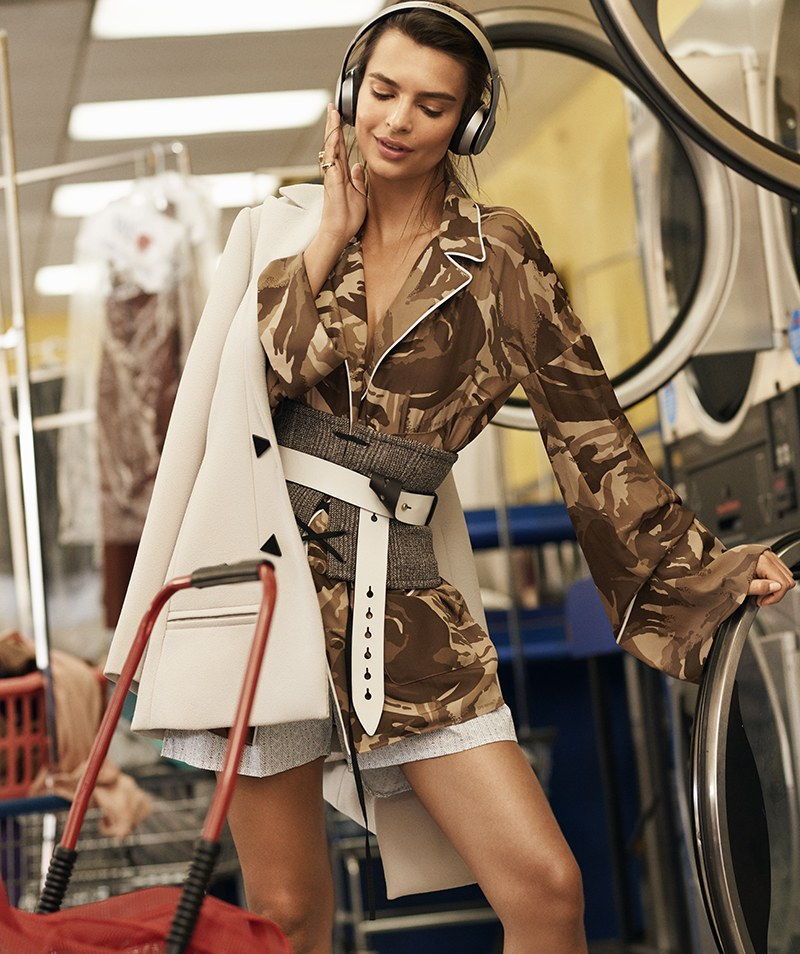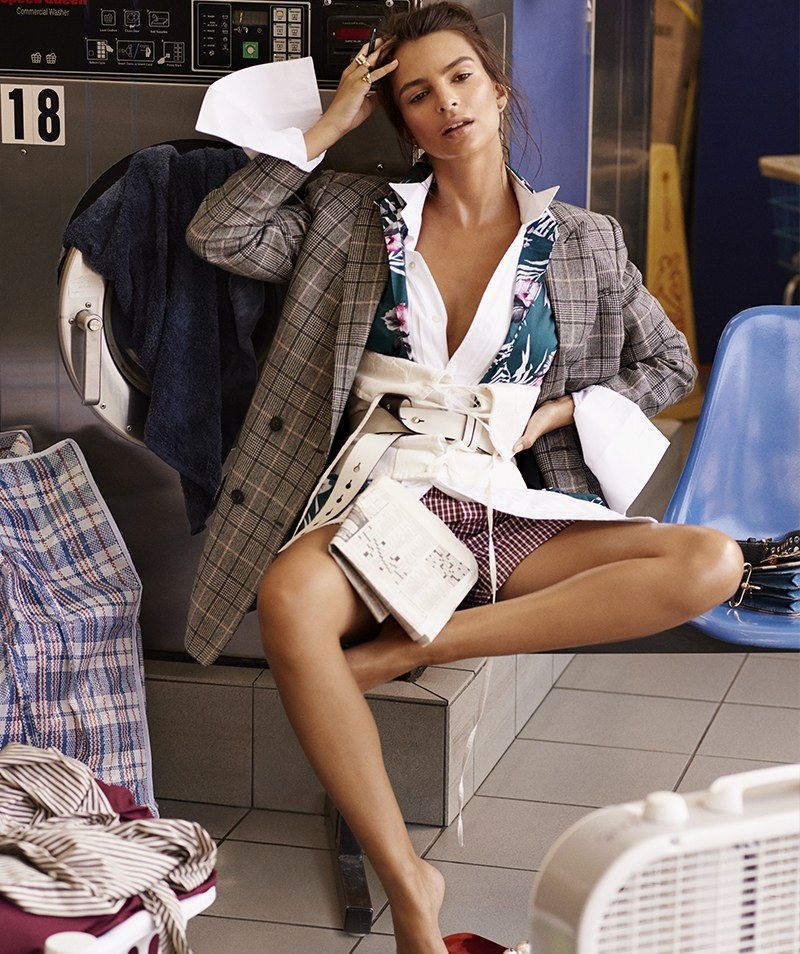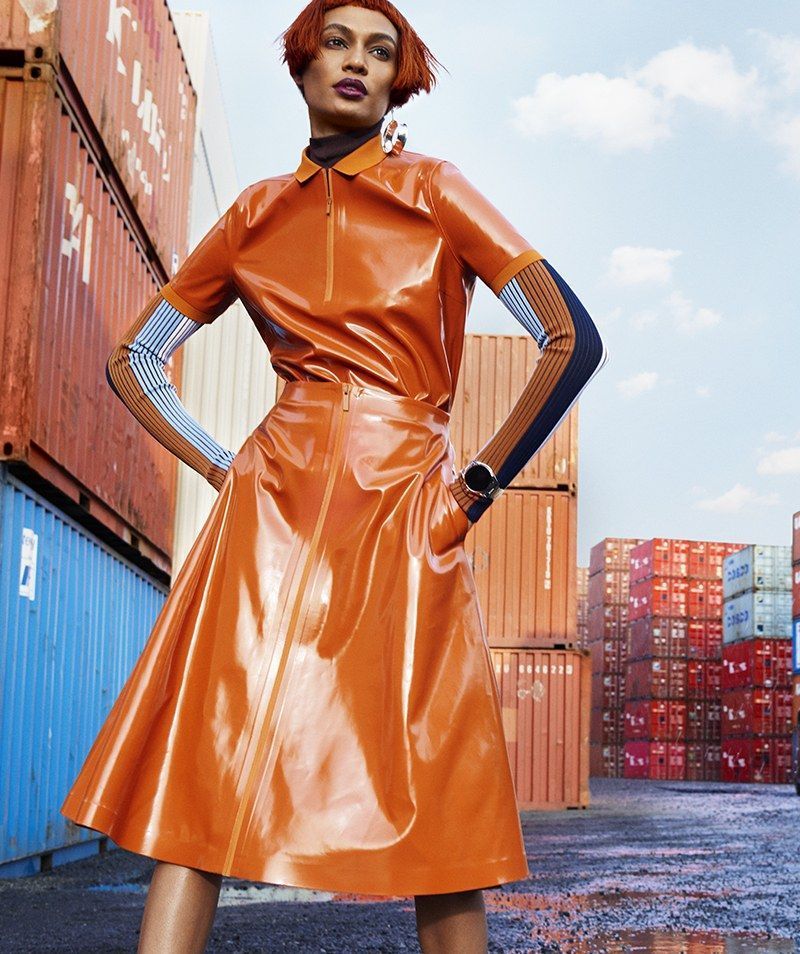Emily Ratajkowski Gets Real About Sexual Double Standards

If you heard Emily Ratajkowski’s name last year, you probably thought of her as that model in the “Blurred Lines” video; the other woman in Gone Girl; or maybe even the fictional Emily Ratajkowski in the Entourage movie. Not anymore. Today Ratajkowski, 25, is known to her 8 million followers as @emrata: model, actress, activist. While young stars in the past have kept their political beliefs to themselves for fear of alienating fans, the fashion industry, or film studios, Ratajkowski’s rapid rise is due in part to the fact that she doesn’t keep quiet. She stumped for Bernie Sanders. She hit Capitol Hill to crusade for public funding of the arts and stood by Planned Parenthood.

Maison Margiela blazer, briefs. Isabel Marant cardigan. Monse caftan. Calvin Klein Collection belt. Foundrae ring.
And she doesn’t apologize for her sexuality either. When critics lambasted Kim Kardashian West for her nude selfie, Ratajkowski defended her and then posted a photo of the two women together—topless—flipping off the haters. She captioned it, “We are more than just our bodies, but that doesn’t mean we have to be shamed for them or our sexuality.” When journalist Piers Morgan mocked her for channeling Lady Godiva nude on a white horse for Harper’s Bazaar, tweeting, “Do you want me to buy you some clothes?” Ratajkowski wrote back, “Thanks, but I don’t need clothes as much as you need press.” And her opinions go more than 140 characters deep: She penned a poignant essay for Lena Dunham’s Lenny Letter, titled “Baby Woman,” in which she detailed how society made her feel guilty for developing D-cup breasts at age 12. “I wish the world had made it clear to me that people’s reactions to my sexuality were not my problems, they were theirs,” she wrote. It resonated. Commented @mzzippy50, “Emily, please keep speaking out.”
Never fear, @mzzippy50: “Talking about feminism and politics can really annoy people,” Ratajkowski acknowledges to Glamour. “But to me, it’d be crazy not to. I’d like to be able to sleep well at night.” And her career is doing just fine: She improvs in the new Netflix show Easy, out now; plays a villain in the upcoming film In Darkness; and flips the script as the love-struck woman in Cruise. For her Glamour cover story, Ratajkowski serves up another piece of cultural analysis,this time on the “attention- seeking” double standard she says women often face. Emily, the mic is yours.
In February, during a snowstorm in New Hampshire, I had the honor of speaking at a Bernie Sanders rally. Having been politically minded throughout my life, I felt it only natural to support the candidate I believed in. The Internet, however, felt otherwise. After posting a picture of myself at the rally and a video of my speech about Bernie’s positions on equal pay, maternity leave, and economic inequality, I was trolled heavily. Commenters said I had “an excess of beauty and lack of brain” and told me to “shut up and show us your tits.” But I was also criticized in a very specific way— for seeking attention. They wrote me off as “a desperate attention whore,” saying I was taking part in the conversation only because everybody else was too.
I realized then that I’ve been called an attention whore so often that I had almost gotten used to it. And as women we are accused of seeking attention more than men are, whether for speaking out politically, as I did, for dressing a certain way, or for even posting a selfie. Our culture has a double standard that runs so deep, many women have actually built up an automatic defense—attempting to be a step ahead of potential critics by making sure we have “real” reasons for anything we say or do.
Often it’s men propelling these acts of sexism, but women discount one another too: Think about how many times you’ve heard a woman say about another woman, “Oh, she’s just doing that for attention.” We’ve internalized this trope. Our society tells women we can’t be, say, sexy and confident and opinionated about politics. This would allow us too much power. Instead our society asks us to declare and defend our motivations, which makes us second-guess them, all while men do what they please without question.
I see it all the time, particularly when my girlfriends are getting ready to go out. They encounter this moment when they think, I don’t want to look like I tried too hard. They don’t want to be seen as desperate or vain. But my guy friends don’t think twice about whether this shirt or that cologne will make them seem attention seeking. The truth is that both groups want to be noticed. Yet we view a man’s desire for attention as a natural instinct; with a woman, we label her a narcissist.

Emporio Armani coat. Off-White c/o Virgil Abloh shirt. Prada belt, corset. Sunspel boxers.

Alexander Wang blazer. Bonobos shirt. Brooks Brothers tuxedo shirt. Prada corset, belt. Hanro of Switzerland boxers. Kendall Conrad stud. Jennifer Fisher hoop. Rings, from top: Foundrae, Sarah Chloe.
Look at pop culture: Mick Jagger is 73, and he still sometimes wears his shirt open and gyrates onstage. We understand that this is a part of his performance and artistic brand. Meanwhile, when Madonna, who is 58 and a revolutionary in that same kind of artistic sexuality, wears a sheer dress to the Met Gala, critics call her “a hot mess” who’s “desperate.” But isn’t she just making one of her signature political statements about female sexuality (and, incidentally, about our ageist, sexist culture too)? In any case, they are both performers who undoubtedly like attention. So why does Madonna get flak for it while Jagger is celebrated?
It’s absurd to think that desire for attention doesn’t drive both women and men. Why are women scrutinized for it more, then? And if a woman dresses up because she does want attention, male or otherwise, does that make her guilty of something? Or less “serious”? Our society doesn’t question men’s motivations for taking their shirt off, or shaving, or talking about politics—nor should it. Wanting attention is genderless. It’s human.
In August a young woman, Karina Vetrano, was raped and murdered while on a jog in Queens, New York. The New York Daily News published an article about “the brainy and beautiful victim,” including a selfie of Vetrano from her Instagram. One commenter said, “Poor girl yes. But she put herself out there like a Kardashian carbon copy.” Later he added, “If you’re going to be out there, be prepared for the attention, good and bad.” This is how far the attention accusation can go: It validates the idea that this woman’s actions—wearing makeup, posting selfies—might have contributed to her senseless murder. Would you have seen the same type of comment had the victim been male? Doubtful. Women should be allowed to be themselves and live the way they want to, just as Vetrano did.
The ideal feminist world shouldn’t be one where women suppress their human instincts for attention and desire. We shouldn’t be weighed down with the responsibility of explaining our every move. We shouldn’t have to apologize for wanting attention either. We don’t owe anyone an explanation. It’s not our responsibility to change the way we are seen—it’s society’s responsibility to change the way it sees us.
Emily Ratajkowsi is an actress, model, and boss-ass lady living in Los Angeles. Follow her @emrata.
Before You Go, Emily, We Need a Life Update!
On Her Career Goals
“The parts I get offered most regularly are parts where you have a main female character who’s relatable, goofy, and great—and then they want me to play the woman who comes in, makes everyone jealous, and ends up being kind of stupid and making the main character look better. But when I read scripts, I’m looking for: Does this character feel real and dynamic to me? Would you see her as a person rather than a stereotype? That’s what I want.”
On Her Feminist Relationship
“I believe men have a responsibility to be aware of what sexism looks like and how it can seep into a relationship. Having my boyfriend [musician Jeff Magid] be aware of that stuff is important to me. I’m lucky; not only was he raised by a single mom, but he also studied philosophy in college. He’s really insightful. I think a feminist relationship looks however you want it to look. There are no rules, like he should be doing the dishes or making dinner half the week, and then I should. You decide how it’s equal. You build it together as a couple.”
On Her Friendships
“Female friendships are really important to me. And it kind of takes a lot, unfortunately, to make good female friends because we’re taught to be so competitive with one another and to think about, basically, Is she as f–kable as me? We’re looking at other women through men’s eyes, through the male perspective. I had to take all of this into consideration before I could have the kind of friendships I wanted to have.”
Fashion Editor: Jillian Davison
Check Out More of Our Cover Stars

Joan Smalls

Kate Upton

